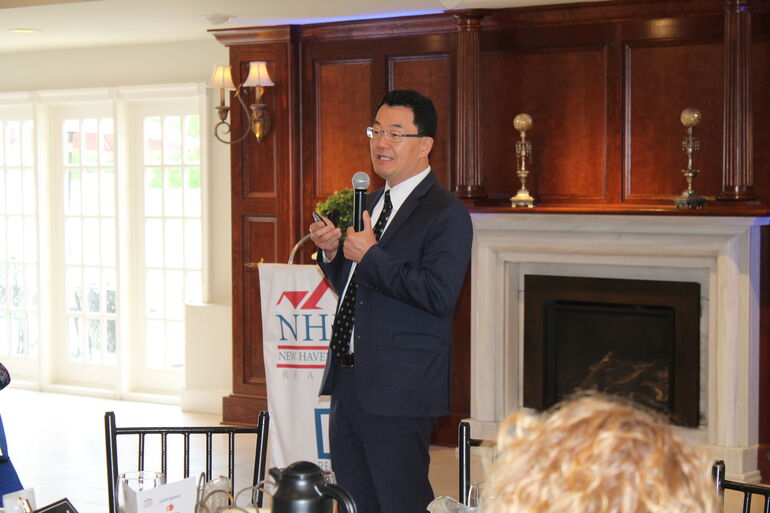Processing Your Payment
Please do not leave this page until complete. This can take a few moments.
-
News
-
Editions
-
- Lists
-
Viewpoints
-
HBJ Events
-
Event Info
- 2024 Economic Outlook Webinar Presented by: NBT Bank
- Best Places to Work in Connecticut 2024
- Top 25 Women In Business Awards 2024
- Connecticut's Family Business Awards 2024
- What's Your Story? A Small Business Giveaway 2024 Presented By: Torrington Savings Bank
- 40 Under Forty Awards 2024
- C-Suite and Lifetime Achievement Awards 2024
- Connecticut's Health Care Heroes Awards 2024
-
-
Business Calendar
-
Custom Content
- News
-
Editions
View Digital Editions
Biweekly Issues
- April 15, 2024
- April 1, 2024
- March 18, 2024
- March 4, 2024
- February 19, 2024
- February 5, 2024
- January 22, 2024
- January 8, 2024
- Dec. 11, 2023
- + More
Special Editions
- Lists
- Viewpoints
-
HBJ Events
Event Info
- View all Events
- 2024 Economic Outlook Webinar Presented by: NBT Bank
- Best Places to Work in Connecticut 2024
- Top 25 Women In Business Awards 2024
- Connecticut's Family Business Awards 2024
- What's Your Story? A Small Business Giveaway 2024 Presented By: Torrington Savings Bank
- 40 Under Forty Awards 2024
- C-Suite and Lifetime Achievement Awards 2024
- Connecticut's Health Care Heroes Awards 2024
Award Honorees
- Business Calendar
- Custom Content
Knock on wood: Economist predicts no recession in 2020
 PHOTO | New Haven Middlesex Realtors
Lawrence Yun addresses New Haven Middlesex Realtors Thursday in Branford.
PHOTO | New Haven Middlesex Realtors
Lawrence Yun addresses New Haven Middlesex Realtors Thursday in Branford.
There was good news, not-so-good news and news somewhere in the vast middle when Lawrence Yun spoke to a luncheon gathering of New Haven Middlesex Realtors Thursday in Branford.
Yun is chief economist and SVP of research for the National Association of Realtors, and brought a national perspective to the group of some 200 mostly residential Realtors eager to peer into the crystal ball to see the outlook for home sales in the months to come.
The good news: Yun said he does not join the chorus of economists who have forecast the onset of a nationwide recession in 2020. The economist cited continued low interest rates and high consumer confidence. “By July of this year we will have experienced the longest period of continuing economic expansion in recorded U.S. history,” said Yun. That’s the nationwide outlook. Here in Connecticut, the optimism is much more muted. High taxes, higher debt and heavy-handed state government policies and regulations have sapped much of the state’s economic vitality, according to Yun.
One measurement of that is job growth. Since 2000, Yun said, the U.S. economy has grown the number of jobs by 13 percent. That includes 21 million new jobs since 2010 — and 2.6 million in just the past 12 months, he said.
In Connecticut the picture is a little different. Since 2000 the Constitution State is one of only three states (along with Illinois and West Virginia) to have actually lost jobs (down 1 percent for the period). By contrast, Yun pointed to Texas, which has grown its job count by nearly a third (32 percent) over the same period.
That Connecticut stagnation is reflected in job-growth figures from the state’s principal job markets: Bridgeport/Stamford/Norwalk (jobs down 3 percent), Hartford metro (up 1 percent) and Norwich/New London (0 percent). Metro New Haven performed somewhat better — 4 percent job growth since 2000 — but still far below the national average of 13 percent for the same period.
How is this reflected in the residential real estate market? Yun pointed to figures for buyer traffic — prospective home-buyers actively looking for a house to buy. Connecticut was again among just three states (with California and West Virginia) where traffic was “weakest,” according to National Association of Realtors data. But another New England state — low-tax, low-regulation New Hampshire — joined Idaho and Wyoming as states charting the heaviest potential buyer traffic.
For the year to come, Yun projected “moderate” growth in the U.S. housing market, but essentially flat home sales in Connecticut. One factor that has influenced home sales here and beyond is younger adults, especially millennials, reaching major life milestones — such as marriage, having children and buying their first homes — later in life than previous generations.
Yun also noted that in 2018 fully one-third of all first-time home-buyers had financial help from family members in taking the leap.
Asked what measures state and local governments could take to help stimulate the housing market, Yun pointed to public policies that constrain housing supply. He said municipal governments might ease local zoning restrictions to encourage more home construction, including multi-family housing. In addition, local governments in Connecticut (New Haven is one) can designate so-called opportunity zones and employ tax incentives as a stimulus to housing development.
Contact Michael C. Bingham at mbingham@newhavenbiz.com

2022 Giving Guide
This special edition informs and connects businesses with nonprofit organizations that are aligned with what they care about. Each nonprofit profile provides a crisp snapshot of the organization’s mission, goals, area of service, giving and volunteer opportunities and board leadership.
Learn more
Subscribe
Hartford Business Journal provides the top coverage of news, trends, data, politics and personalities of the area’s business community. Get the news and information you need from the award-winning writers at HBJ. Don’t miss out - subscribe today.
Subscribe
2024 Book of Lists
Delivering Vital Marketplace Content and Context to Senior Decision Makers Throughout Greater Hartford and the State ... All Year Long!
Read Here-
2022 Giving Guide
This special edition informs and connects businesses with nonprofit organizations that are aligned with what they care about. Each nonprofit profile provides a crisp snapshot of the organization’s mission, goals, area of service, giving and volunteer opportunities and board leadership.
-
Subscribe
Hartford Business Journal provides the top coverage of news, trends, data, politics and personalities of the area’s business community. Get the news and information you need from the award-winning writers at HBJ. Don’t miss out - subscribe today.
-
2024 Book of Lists
Delivering Vital Marketplace Content and Context to Senior Decision Makers Throughout Greater Hartford and the State ... All Year Long!
ABOUT
ADVERTISE
NEW ENGLAND BUSINESS MEDIA SITES
No articles left
Get access now
In order to use this feature, we need some information from you. You can also login or register for a free account.
By clicking submit you are agreeing to our cookie usage and Privacy Policy
Already have an account? Login
Already have an account? Login
Want to create an account? Register
Get access now
In order to use this feature, we need some information from you. You can also login or register for a free account.
By clicking submit you are agreeing to our cookie usage and Privacy Policy
Already have an account? Login
Already have an account? Login
Want to create an account? Register






0 Comments